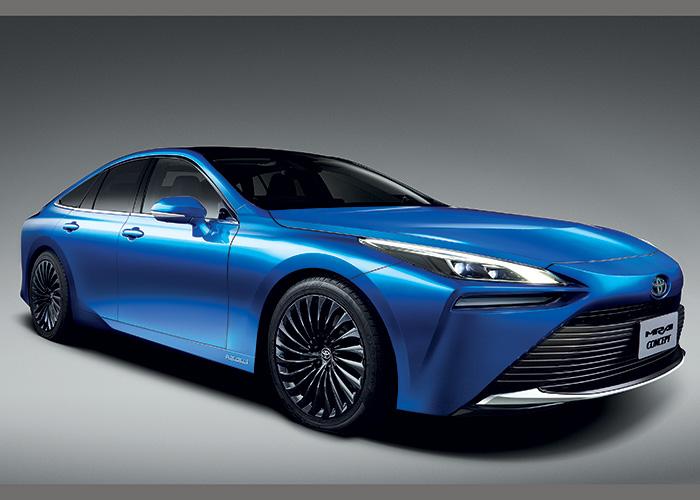Toyota pushes the boundaries of automotive technology. Last May, the New Mirai traveled no less than 1,003 km, the longest distance ever recorded by a hydrogen vehicle, without passing through a refueling point. No less than four drivers have succeeded each other at the wheel of this sedan, applying the precepts of eco-driving to break this record. The distance was covered on a route located south of Paris, in Loir-et-Cher and Indre-et-Loire.
If need be, this event shows how Toyota is at the forefront of hydrogen mobility. As early as 2014, the manufacturer marketed the first generation of Mirai, a fuel cell sedan never seen before. This revolution could not have seen the light of day without the experience acquired by Toyota in hybrid engines.
A competitive cost
Marketed in France since the beginning of the year, the second-generation Mirai goes even further in the advent of zero-emission hydrogen mobility. Optimization of the fuel cell, increased storage capacity and better aerodynamics bring its range to 650 km in normal driving (mixed WLTP), a gain of 30% compared to its predecessor. The icing on the cake, the full is done in five minutes in a station compressing the hydrogen to 700 bars. Offered at 67,900 euros including tax, or 15% less than the first generation, the New Mirai is aligned with the plug-in hybrid and electric sedans in its segment. Its interest will be reinforced by the increase in the number of hydrogen stations and by government incentives to drive cleanly.
“Toyota sees hydrogen as an efficient fuel for the future,” says Yoshikazu Tanaka, chief engineer within the group. Our goal is to help solve environmental and energy problems through the mass production of fuel cell vehicles. These use hydrogen to operate, are very efficient, can travel long distances, refuel quickly and emit only water. They have huge potential as the ultimate eco-friendly cars. »
Rarely mentioned, the technology of the Mirai also makes it possible to purify the absorbed air to ensure a synthesis between oxygen and hydrogen. The fuel cell system thus filters sulfur dioxide (SO2), nitrogen oxides (NOx) and fine particles. More than 95% of particles between 0 and 2.5 microns are eliminated.
Sales of fuel cells multiplied by ten

For Toyota, the Mirai represents one of the axes of development of hydrogen among others. Its experts indeed expect global sales of fuel cells to increase tenfold in the short term. To accelerate on the road to hydrogen, Toyota has created a European entity, the Fuel Cell Business Group, whose activity focuses on this technology and which will share its expertise with its commercial partners. In addition to cars, hydrogen already powers trucks, city bus fleets, forklifts and generators.
The manufacturer's technologies, for example, equip the H2.City Gold hydrogen bus manufactured by the Portuguese CaetanoBus. At the beginning of the year, the RATP tested one of these buses in Val-de-Marne. Another mobile application, the train is also advancing on the path of hydrogen. Through the supply of a fuel cell, Toyota participates in the FCH2RAIL consortium to run trains without emitting emissions and without using catenaries.
A hydrogen-powered Woven City
In addition to these mobile applications, Toyota is exploring static uses. The foundation stone for Woven City, the city of the future, was laid on February 23 at a former Toyota storage site in Susono City, Japan (see box below). Still with a view to the city of the future, Toyota has approached the prefecture of Fukushima to develop hydrogen there.
In Paris, Toyota is also a shareholder of HysetCo, the operator of Hype taxis whose fleet of hydrogen vehicles, the largest in the world, should reach 600 units in the short term. And in January, HysetCo bought the Slota group whose diesel vehicles will be gradually replaced by Mirai. Like Japan, Paris and France are a showcase of Toyota's expertise in hydrogen.
Woven City: the future of autonomous driving
In Woven City, the city of the future that it is building in Japan, Toyota is giving a large place to the autonomous car. Three types of streets are programmed. The first will be reserved for autonomous driving, the second for pedestrians and the third for individual modes of travel. Autonomous driving was also invited to the Tokyo Olympics. For this edition, Toyota designed the e-Palette, a level 4 autonomous shuttle able to accommodate twenty passengers. It transported athletes and staff to the Olympic and Paralympic villages.
Similarly, Toyota is working on the connectivity of its vehicles. The manufacturer has just signed an agreement with Suzuki, Subaru, Daihatsu and Mazda for more practical and safer connected services. All these cutting-edge technologies irrigate the models marketed to the general public as well as companies, for enhanced comfort and safety.
Navy goes hydrogen
The technologies developed by Toyota concern all forms of mobility. Its fuel cell, installed since 2020 on the Energy Observer vessel, has for example been tested on the Atlantic and Pacific oceans. This exceptional catamaran is thus the first energy self-sufficient vessel. EODev, the technological unit, is an electric generator for maritime use, adaptable to different types of ships and compliant with environmental and regulatory constraints. This collaboration marked Toyota's entry into a sector of activity, that of supplier of fuel cells.
Born in 2017, Toyota's partnership with Energy Observer has gained new momentum. Last April, the manufacturer entered the capital of the company Energy Observer Developments (EODev), which is piloting the project. At the same time, the Toyota fuel cell found its first concrete maritime application with the HYNOVA 40, the first hydrogen-powered electric dayboat on the market. For its part, the Fountaine Pajot shipyard is launching a pilot project around Toyota technologies. Hydrogen is indeed in vogue on the waves.










SOS Public Hospital: our revelation...
The best smartphones for gaming in...
Free tips in video: Free Mobile off...
Google Maps: activate the new widge...